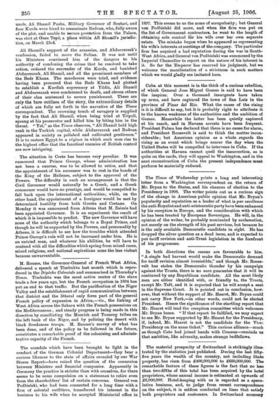In both directions the omens are favourable to him. "A
single bad harvest would make the Democratic demand for tariff revision almost irresistible," and though Mr. Roose- velt has stolen the Democratic thunder by his campaign against the Trusts, there is no sure guarantee that it will be continued by any Republican candidate. All the most likely men are either identified with, or friendly to, the Trusts, except Mr. Taft, and it is expected that he will accept a seat in the Supreme Court. It is pointed out in conclusion, how- ever, that without the support of Mr. Hearst, Mr. Bryan could not carry New York,—in other words, could not be elected President. Hence the significance of the startling report that Mr. Hearst will lead the reception committee which welcomes Mr. Bryan home. "If that report be fulfilled, we may expect to see Mr. Bryan supported by Mr. Hearst for the Presidency, if, indeed, Mr. Hearst is not the candidate for the Vice. Presidencyon the same ticket." This curious alliance—much as though Cato had joined hands with Crassus—reminds us that ambition, like adversity, makes strange bedfellows.


































 Previous page
Previous page